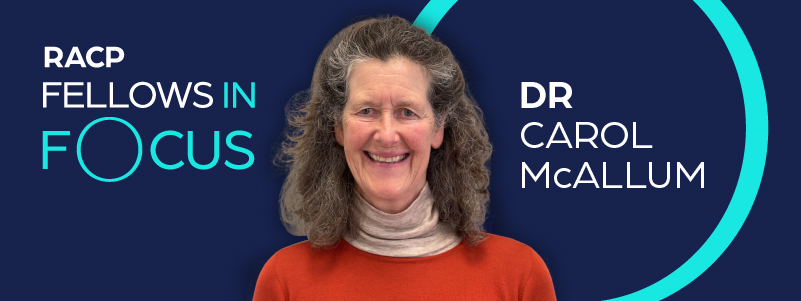RACP Fellows in Focus: Dr Carol McAllum
Date published:
15 Oct 2021

Before specialising in palliative care, Dr Carol McAllum was a solo, rural general practitioner for about 16 years. During that time, she met many people who were in their last months, days and hours of life. In her preceding training and hospital years, she had lingered longer with people who were dying, knowingly or otherwise. When North Haven Hospice opened in Whangarei (Aotearoa New Zealand), she became one of four general practitioners who provided medical care for the patients.
“I had an uneasy feeling that what I was doing was perhaps not the best. I felt that there were probably better ways of doing things, and I wasn’t sure that what I knew was enough. I was unfamiliar with the medications and the doses used in palliative care.”
However, fate was about to help gently nudge Carol in the right direction. In 1999, she was fortunate to be awarded the Donny Fellowship in Palliative Care and took a year out from general practice to do this. “And I never went back,” she explained, “I did my time in hospices for several years and acquired a Master of Palliative Care.” Twenty years ago this was a rather unconventional entry point to become, as Carol did, a Fellow of the RACP’s Australasian Chapter of Palliative Medicine.
To an outsider or newcomer, the prospect of entering palliative care can be daunting. When asked about what she believed to be essentials for her job, she explained, “The principles of palliative care are constant, regardless of setting. They are about marrying the needs and goals of the person and family with what medicine can offer. The person is a critical team member. Palliative care is not just disease management. It is just good medicine. It is caring for the person as a human being wherever they are and when disease modifying management escapes our control.”
“I’m not sure all health professionals acknowledge just how profoundly the setting has an impact on the delivery of care. Being the imperfect humans we are, we often have something to say about how ‘others’ or ‘other teams’ work. Having worked in general practice, acute hospitals, residential care facilities, and hospices, I have lived and seen the ‘other side’ and I like to reduce the distance between ‘them’ and ‘us’. I believe we are all ‘us’, but some of us don’t know it. I like bridging and translating to make things easier for everyone.”
“To walk in the shoes of another is our greatest learning experience,” she emphasised.
Carol spent many years training and mentioned that she’d been fortunate enough to have wonderful mentors - patients and colleagues alike. Carol described a half-day visit to Mary Potter Hospice in Wellington. She was in her fourth year as a doctor. “That time made such an enormous impression on me. I didn’t realise what a profound effect it had until years later. It was my first contact with the care of people who knew they had a finite time in this world and the care was so different from what I had experienced. Time was precious and the doctors and nurses cared in a multitude of ways, not just about a person’s disease. They didn’t hide that life was ending and that really stayed with me. However, it would be 14 years before the opportunity to work in palliative care presented itself, but at the time, I had no idea of the imprint the Mary Potter experience was going to have on me.”
Despite the upheaval in her personal life, Carol chose to leave general practice for a year, relocate and then subsequently complete a masters degree. “Being in my 40s I had the energy that I no longer have,” she half-joked. It was no small feat for her and put a huge strain on herself and her family. However, with every challenge comes amazing opportunities, “My contribution to palliative care has been in many ways. Supporting hospices i.e. community-based and those with inpatient units, working in hospital palliative care teams, working with general practitioners, eight years on the Palliative Care Council which provided advice for the Minister of Health, being a palliative medicine medical advisor for the New Zealand Formulary, post-graduate lecturer at Auckland University, and Associate Dean at Otago Wellington University.”
When asked about her passion for the job, Carol said, “I’m most passionate about making life easier for people in their last days of life and for colleagues whose substantive work is not in palliative medicine. I really respect what my colleagues do and that they may be dealing every day with people who are dying or are in their last phase of life. I like to do all I can to support them to support their patients. Ultimately, it’s all about the end of life being as fulfilling, meaningful and comfortable as possible for everyone.”
And what were Carol’s parting words for those that would seek to tread a similar pathway? She offered, “In my career, I have valued my colleagues and I am a better person for the deep insights that my work has given me. I am proud of being able to make a difference for the person in front of me and for their significant others when their time is running short. So, don’t hold back, be comfortable to take the less well-trodden path, talk with colleagues, seek mentors and be true to yourself. Medicine is a tough mistress regardless of the path we take, so choose the path that your intuition and passion take you. It will carry you through.”